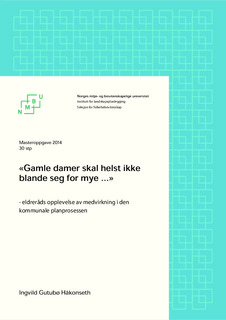| dc.contributor.author | Håkonseth, Ingvild Gutubø | |
| dc.date.accessioned | 2014-08-21T10:11:12Z | |
| dc.date.available | 2014-08-21T10:11:12Z | |
| dc.date.copyright | 2014 | |
| dc.date.issued | 2014-08-21 | |
| dc.identifier.uri | http://hdl.handle.net/11250/217804 | |
| dc.description.abstract | Bakgrunn: Det blir flere og flere eldre, de lever lenger og har bedre helse enn tidligere. Til tross for sitt politiske engasjement er de lite representert i folkevalgte organer. Eldrerådslova med påbud om eldreråd i alle landets kommuner og fylkeskommuner skal styrke eldres innflytelse i politiske prosesser. Medvirkning i planlegging knyttes til folkehelse og empowerment, og kan forstås ut fra ulike teorier.
Mål: Formålet med studien er å belyse og få en dypere forståelse av hvordan eldrerådsmedlemmer i norske kommuner opplever sin mulighet til medvirkning i den kommunale planprosessen.
Metode: Det ble valgt et kvalitativt design med en fenomenologisk tilnærming. Det er blitt utført gruppesamtaler av eldrerådene i tre norske kommuner. Til sammen var det åtte informanter. Gruppesamtalene ble tatt opp på lydbånd, transkribert og analysert etter Malteruds systematiske tekstkondensering.
Resultater: Av eldrerådenes opplevelser ble det identifisert fire faktorer som påvirker eldrerådenes medvirkning i planprosesser: Tid, holdninger/oppfatninger, økonomi og politikk, og kunnskap. Eldrerådene hadde ulike opplevelser av hvordan faktorene begrenset eller styrket deres medvirkning.
Konklusjon: Faktorer som begrenser eldrerådets medvirkning var liten tid til eldrerådsarbeidet, sen involvering i planprosessen, negative holdninger innad og til eldrerådet, trang kommuneøkonomi, lite involvering og mangel på kunnskap. Positive holdninger, kommuner som så nytte av eldrerådet, kunnskap og eldrerådenes egen initiativevne ble sett som faktorer som styrker medvirkningen. Sammen avgjorde faktorene om eldrerådene hadde en reell eller kun symbolsk form for medvirkning.
Abstract
Background: The number of older people increases, the live longer and have better health than before. Despite their political engagement, their representation in elected bodies are poor. The Council for the Elderly Act imposes Norwegian municipalities and counties to have councils for the elderly to strengthen the elderly’s influence in political processes. Citizen participation in planning is connected to public health and empowerment, and is understood from different theories.
Objective: The objective of this study is to get a deeper understanding of how the members of councils for the elderly in Norwegian municipalities experiences their opportunity to citizen participation in the municipal planning process.
Method: A qualitative design with a phenomenological approach was chosen. It has been conducted group discussions of the council for the elderly in three Norwegian municipalities. There were eight informants in total. The group discussions were taped, transcribed and analyzed according to Malteruds Systematic Text Condensation.
Results: Four factors affecting the councils for the elderly’s participation in the planning process were identified from the informants’ experiences. Time, attitudes/beliefs, economics and politics, and knowledge. The councils for the elderly had different experiences of how these factors limited or strengthened their participation.
Conclusion: Factors that limit citizen participation for the councils of elders was little time for the work of the councils for the elderly, late involvement in the planning process, negative attitudes within and to the council for the elderly, narrow municipal budgets, lesser degree of involvement and lack of knowledge. Positive attitudes, municipalities that valued the council for the elderly, knowledge and the initiative of councils was seen as factors that strengthen citizen participation. Together the factors determined whether the participation level of the councils for the elderly was at levels of citizen power or only at levels of tokenism. | nb_NO |
| dc.language.iso | nob | nb_NO |
| dc.publisher | Norwegian University of Life Sciences, Ås | |
| dc.subject | medvirkning, eldreråd, kommunal planprosess, empowerment, folkehelse, citizen participation, councils for elderly, public health | nb_NO |
| dc.subject | VDP::Samfunnsvitenskap: 200::Statsvitenskap og organisasjonsteori: 240::Offentlig og privat administrasjon: 242 | nb_NO |
| dc.subject | VDP::Medisinske Fag: 700::Helsefag: 800 | nb_NO |
| dc.title | «Gamle damer skal helst ikke blande seg for mye …» : eldreråds opplevelse av medvirkning i den kommunale planprosessen | nb_NO |
| dc.title.alternative | "Old ladies should preferably not interfere too much ..." : how councils for elderly experience citizen participation in the municipal planning process | |
| dc.type | Master thesis | nb_NO |
| dc.source.pagenumber | 74 | nb_NO |
| dc.description.localcode | M-FOL | nb_NO |
